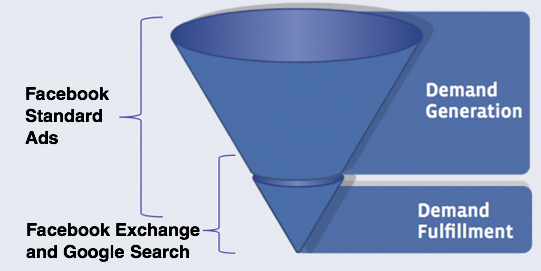
Google and Facebook are getting a bit friendlier despite their social networking competition. Google's DoubleClick ad buying software will soon allow clients to buy retargeted ads on Facebook. FBX, Facebook's retargeted ads platform, has become a major player in the 16 months since launch, and DoubleClick will be a more comprehensive ad buying solution by tapping into it.
Google writes "Partnership has been key to Google's success as a rising tide lifts all boats. So we're excited to announce a new way to help our clients succeed by working with Facebook to participate in FBX, their real-time bidding exchange…we're always looking at ways to serve our clients even better – starting in a few months, clients will be able to buy inventory on FBX via DoubleClick Bid Manager."
DoubleClick allows clients to buy ads on dozens of different ad exchanges, but excluding Facebook may have forced some clients to look elsewhere for their media buying needs. Once the integration is live, DoubleClick will become more of a one-stop-shop for buying ads across the web.
Facebook launched FBX in June 2012 to let advertisers buy cookie-based retargeted ads on Facebook's site. When someone visits an advertiser's website, say to buy a flight to Hawaii, a cookie is dropped onto the user's computer. The site can then pass this cookie to a demand side platform (DSP) ad tech service that uses it to target that same user with an ad on Facebook. So if the person didn't buy the flight, the travel site can show them ads hawking that exact same flight at a discount in hopes of getting them to pull the trigger.
Facebook started with a small set of DSPs but expanded the ranks over time, yet Google was nowhere to be found. Soon that will change, as DoubleClick will become one of these DSPs with access to place ads on Facebook through FBX. In this way, both Google and Facebook can make money off of advertisers together.
It's unclear who reached out to who about the deal. While Google may have hoped that FBX would flop, the platform gained steam and became necessary to support in DoubleClick, so it may caved. Or perhaps Facebook pushed for the partnership in hopes of driving more FBX sales.
 Either way it proves that Google doesn't have a stranglehold on demand fulfillment anymore, as I wrote in April. Facebook is successfully breaking into the lucrative bottom of the funnel with FBX.
Either way it proves that Google doesn't have a stranglehold on demand fulfillment anymore, as I wrote in April. Facebook is successfully breaking into the lucrative bottom of the funnel with FBX.
Historically, Facebook ads have centered on demand generation — getting people to want to buy something. But that space doesn't command as high of ad rates as demand fulfillment — getting people to buy something they already want from a specific seller.
FBX and retargeted ads in general can reach people who've already been considering a purchase, and the return on investment is often clearer because the ads can be the last click before a purchase. In this way, FBX ads are similar to and compete with search ads, which are Google's bread and butter. Even if Google will be selling these FBX ads, most of the money goes to Facebook.
The deal will create more competition for advertisers between FBX providers. Now Nanigans, AdRoll, TellApart, and other startups that serve ads on FBX will have to compete with Google. At the same time, the move validates the space of these startups and might signal to more businesses that they should be investing in retargeted campaigns.
While you might assume the two tech giants are at each other's throats because of competitions between Facebook and Google+, but relations have improved over the last few years. Facebook ended up working with Microsoft's Bing to power web searches and ads in Graph Search, but at the feature's launch even Mark Zuckerberg said "I would love to work with Google".
All of this is a big endorsement of retargeting as an ad format, but there's one problem. FBX doesn't work on mobile…yet. And that's where users are going. Facebook may very well be hard at work at getting FBX ready for mobile. But in the meantime, I'm very excited about this startup URX, which lets ecommerce apps retarget their existing users with ads that deeplink directly to specific products in the app and get people to buy them.
Expect mobile retargeting to be the next big space for innovation, investment, and acquisitions.
No hay comentarios:
Publicar un comentario